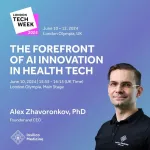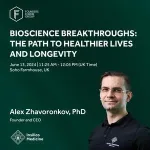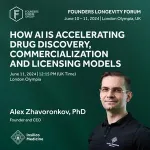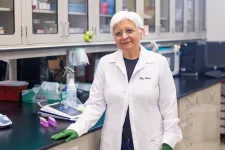(Press-News.org) Alex Zhavoronkov, Ph.D., founder and CEO of Insilico Medicine (“Insilico”) will present at the 6th LSX Nordic Conference happening in Copenhagen Oct. 10-11. Zhavoronkov, a leader in generative artificial intelligence (AI) technologies for drug discovery and biomarker development, will present on Oct. 11, 2pm CET on “‘How Artificial Intelligence is Shaping the Future of Drug Discovery, Design, and Development.”
The LSX Nordic Congress is a leading strategy, investment and partnering conference for the Nordic region connecting life science and healthcare industry leaders with international investment and strategic partners. The mission is to facilitate ever greater international investment into the region, as well as foster strategic partnerships and collaboration with key international healthcare stakeholders.
Insilico is a leading innovator in advancing new therapeutics using generative AI and reinforcement learning and has developed an end-to-end Pharma.AI platform for identifying novel targets (PandaOmics), designing new drugs (Chemistry42), and predicting the outcomes of Phase II to Phase III clinical trial transitions (inClinico). Using this platform, Insilico has produced four clinical-stage drugs including a lead drug for the devastating chronic lung disease idiopathic pulmonary fibrosis (IPF), the first AI-discovered and AI-designed drug to advance to Phase II trials. The Company also recently entered into an $80m upfront strategic licensing agreement with Exelixis for a synthetic lethality USP1 inhibitor for BRCA-mutant tumors that is in Phase I trials and has a small molecule inhibitor of QPCTL that was co-developed with Fosun Pharma currently in Phase I clinical trials.
In all, the Company has 31 AI-designed drugs in its pipeline, many of which are available for partnering and licensing, for indications including cancer, fibrosis and immunology.
About Insilico Medicine
Insilico Medicine, a clinical-stage end-to-end artificial intelligence (AI)-driven drug discovery company, connects biology, chemistry, and clinical trials analysis using next-generation AI systems. The company has developed AI platforms that utilize deep generative models, reinforcement learning, transformers, and other modern machine learning techniques to discover novel targets and design novel molecular structures with desired properties. Insilico Medicine is delivering breakthrough solutions to discover and develop innovative drugs for cancer, fibrosis, immunity, central nervous system (CNS) diseases, and aging-related diseases.
For more information, visit www.insilico.com
END
Insilico Medicine founder and CEO Alex Zhavoronkov, Ph.D., to present on AI drug discovery at LSX Nordic Congress
2023-10-05
ELSE PRESS RELEASES FROM THIS DATE:
Grape consumption benefits eye health in human study of older adults
2023-10-05
In a recent randomized, controlled human study, consuming grapes for 16 weeks improved key markers of eye health in older adults. The study, published in the scientific journal Food & Function looked at the impact of regular consumption of grapes on macular pigment accumulation and other biomarkers of eye health.[1] This is the first human study on this subject, and the results reinforce earlier, preliminary studies where consuming grapes was found to protect retinal structure and function.[2]
Science has shown that an aging population has a higher risk of eye disease and vision problems. Key risk factors for eye disease include 1) oxidative ...
Don’t feel appreciated by your partner? Relationship interventions can help
2023-10-05
When we’re married or in a long-term romantic relationship, we may eventually come to take each other for granted and forget to show appreciation. A new study from the University of Illinois Urbana-Champaign finds that it doesn’t have to stay this way.
The study examined why perceived gratitude from a spouse or romantic partner changes over time, and whether it can be improved through relationship intervention programs.
“Gratitude almost seems to be a secret sauce to relationships, and an important piece to the puzzle of romantic relationships that hasn’t gotten much attention ...
Study confirms age of oldest fossil human footprints in North America
2023-10-05
The 2021 results began a global conversation that sparked public imagination and incited dissenting commentary throughout the scientific community as to the accuracy of the ages.
“The immediate reaction in some circles of the archeological community was that the accuracy of our dating was insufficient to make the extraordinary claim that humans were present in North America during the Last Glacial Maximum. But our targeted methodology in this current research really paid off,” said Jeff Pigati, USGS research geologist ...
More than 10,000 pre-Columbian earthworks remain hidden throughout Amazonian forests
2023-10-05
More than 10,000 Pre-Columbian archaeological sites likely rest undiscovered throughout the Amazon basin, estimates a new study. The findings, derived from remote sensing data and predictive spatial modeling, address questions about the influence of pre-Columbian societies on the Amazon region. “The massive extent of archaeological sites and widespread human-modified forests across Amazonia is critically important for establishing an accurate understanding of interactions between human societies, Amazonian forests, and Earth’s climate,” write the authors. ...
New, independent ages confirm antiquity of ancient human footprints at White Sands
2023-10-05
New radiocarbon (14C) and optically simulated luminescence ages have confirmed the controversial antiquity of the ancient human footprints discovered in White Sands National Park, and reported in a study in 2021. Addressing the widespread criticism of their previous study, researchers report that the independent ages from multiple resolved sources conclusively show that the footprints were left behind between roughly 23,000 and 20,000 years ago, demonstrating that humans were present in southern North America during the Last Glacial ...
Special Issue: Ancient DNA
2023-10-05
In this Special Issue of Science, three Reviews highlight how recent advances in the field of ancient DNA have greatly advanced our understanding of the evolutionary history of many plants and animals, including our own species. “This special issue examines the changing landscape of how ancient DNA (aDNA) is studied today, including previously untapped sources, improvements in technology, and ethical challenges, and what we’ve learned about ourselves though ancient DNA,” write Corinne Simonti and Madeleine ...
What are the risks of radioactive wastewater release – the next of which is October 5th – from Fukushima Daiichi nuclear plant?
2023-10-05
Wastewater release from the Fukushima Daiichi nuclear plant in Japan is expected to have negligible effects on people and the ocean, Jim Smith and colleagues report in a Perspective. The planned releases of radioactive wastewater, 350 million gallons of which has been stored at the site since the 2011 earthquake and tsunami that triggered the Fukushima plant’s meltdown, began in August 2023 and are expected to continue for perhaps the next 30 years. The second release is scheduled to start on October 5th. While the scheduled releases have sparked international concern, Smith et al. discuss the science behind the risks and ...
Discovery made about Fischer Tropsch process could help improve fuel production
2023-10-05
A fundamental discovery about the Fischer Tropsch process, a catalytic reaction used in industry to convert coal, natural gas or biomass to liquid fuels, could someday allow for more efficient fuel production.
Washington State University researchers discovered previously unknown self-sustained oscillations in the Fischer Tropsch process. They found that unlike many catalytic reactions which have one steady state, this reaction periodically moves back and forth from a high to a low activity state. The discovery, reported in Science, means that these well-controlled oscillatory states might be used in the future to enhance the reaction rate and the yields of desired ...
New discovery may ‘unlock’ the future of infectious disease and cancer treatment
2023-10-05
University of Birmingham News Release
STRICTLY EMBARGOED UNTIL 14.00 Thursday 5th October ET 2023/ 19.00 Thursday 5th October UK 2023
Researchers have identified a ‘guard mechanism’ for a protein which attacks microbes in infected cells, opening the possibility of new treatments for Toxoplasma, Chlamydia, Tuberculosis and even cancer.
A study, led by the University of Birmingham and published today (5th October) in Science has discovered the lock and key mechanism that controls the attack protein GPB1. GBP1 is activated during ...
Study shows prior exposure to common virus shields against birth defects and miscarriage
2023-10-05
Researchers at Tulane University have shown for the first time that mothers are much less likely to transmit a common virus known to cause miscarriages and birth defects if they are exposed to the virus prior to becoming pregnant. The study marks a significant step toward the development of a vaccine that could protect mothers and their babies.
Cytomegalovirus (CMV) is a common herpesvirus that most women contract unknowingly before reaching child-bearing age. It's usually harmless except during pregnancy when, if passed on to the developing fetus, it is a leading cause ...





